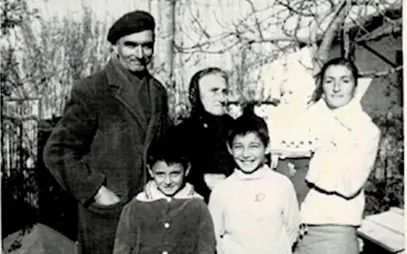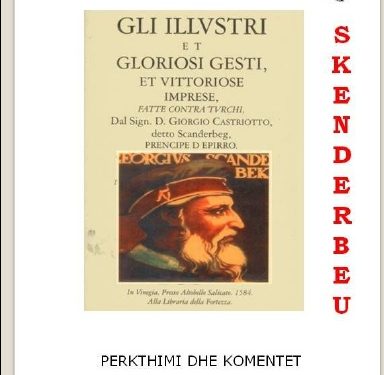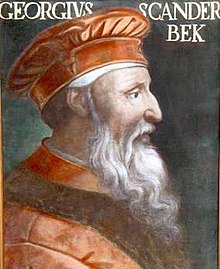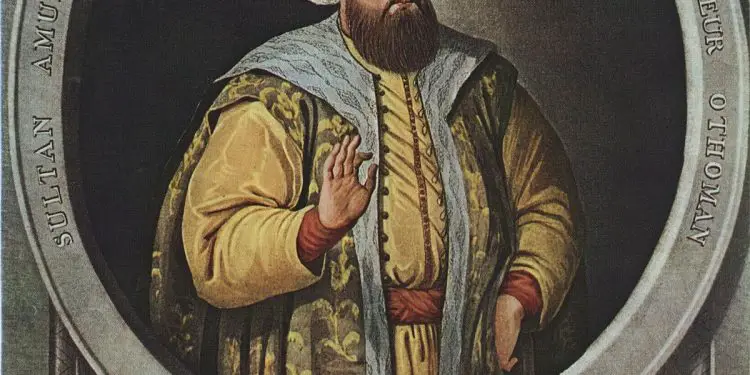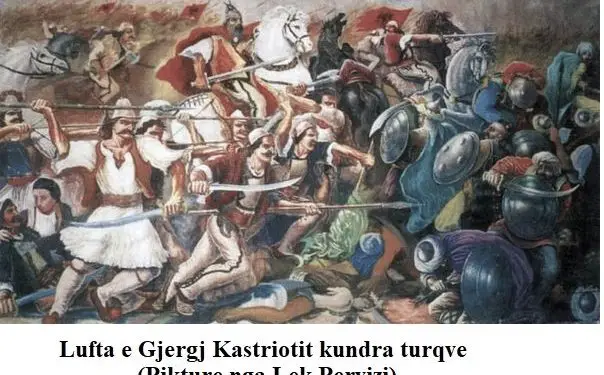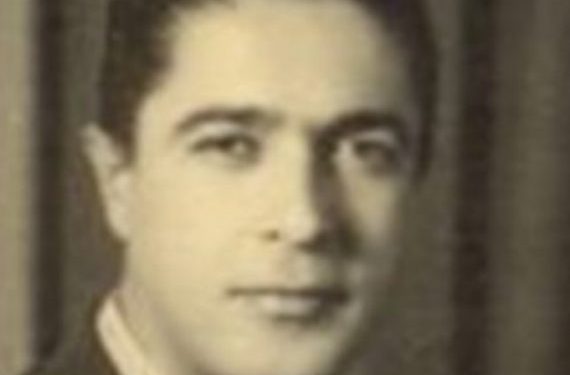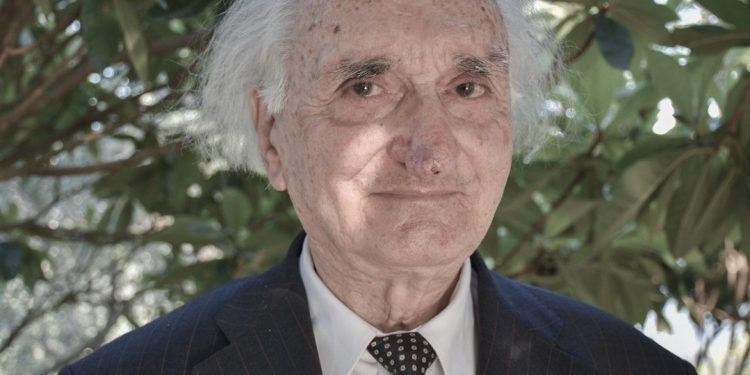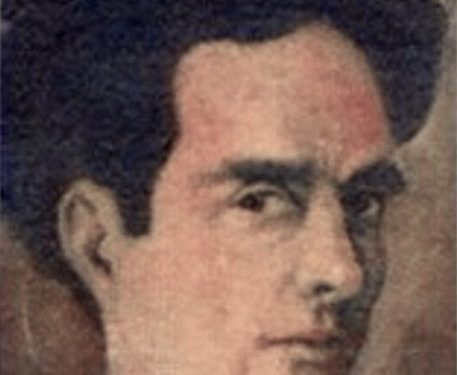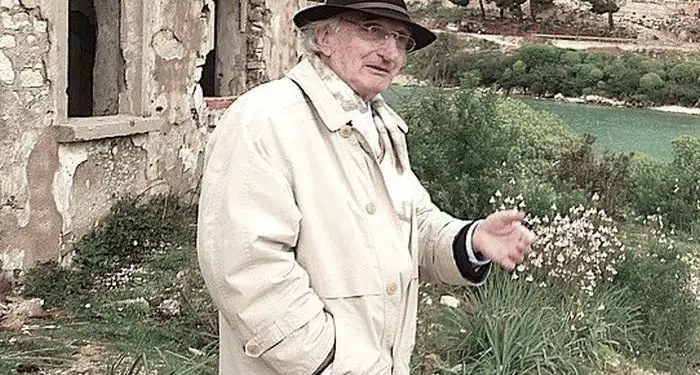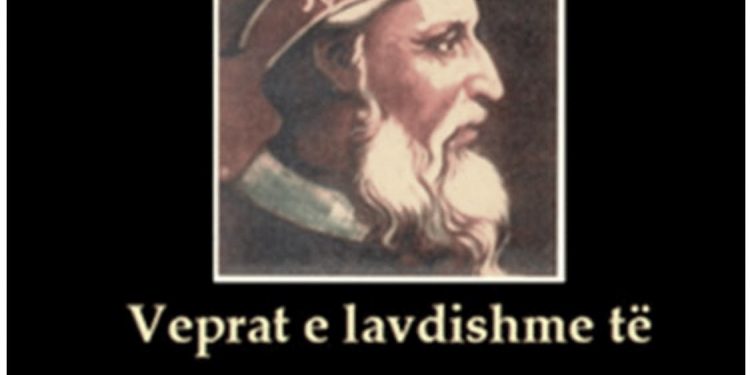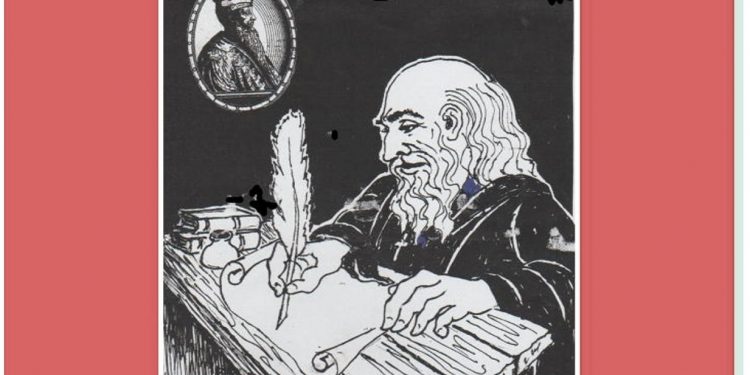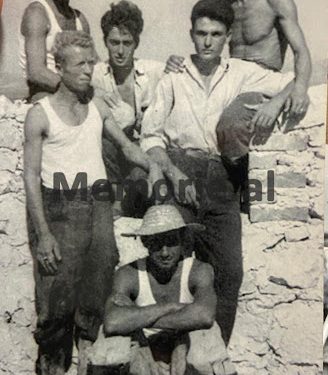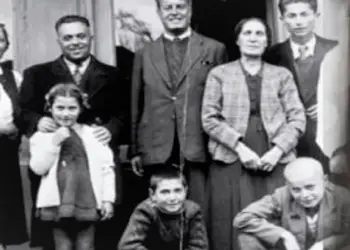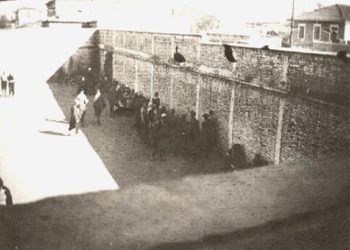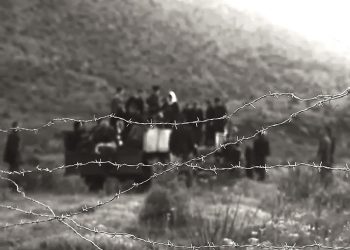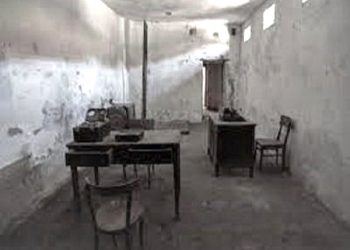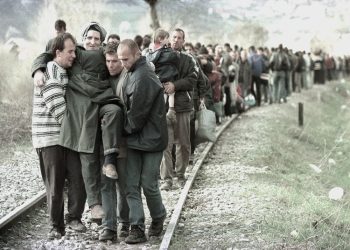Dashnor Kaloçi
Memorie.al publishes the unknown story of the book about our National Hero, Gjergj Kastrioti Skënderbeu, which was written in Italian in 1584, by the Albanian priest, Dhimitër Frangu. How that book was found a few years ago in one of the libraries of Rome, by Lek Pervizi, painter, poet, publicist, researcher, writer, etc., former political persecutor who suffered as a family for almost 45 years in the internment camps of the communist regime of Enver Hoxha, who is also the translator of that work published a few years ago in Tirana, by the Publishing House “Arbëria”. Some parts from the rare book of Dhimitër Frangu translated by Lek Pervizi, where the unknown correspondence of Gjergj Kastrioti Skënderbeu with Sultan Murat is given!
All the life, deeds and glorious wars of our National Hero, Gjergj Kastrioti Skënderbeu, considered as “Athlete and defender of Christianity”, or “Armor on the chest of Europe”, from the time in which he lived, until nowadays, has aroused and continues to arouse interest still. As a result, from numerous chroniclers, biographers, writers, scholars and historians, local and foreign, dozens and dozens of books have been dedicated to Skanderbeg with various studies of a historical nature, most of which are unknown for Albanians and are in the libraries of different countries of the world. One of those books is the one entitled “The glorious works of Skanderbeg”, by the Albanian priest, Dhimitër Frangu, contemporary, advisor, treasurer and ambassador of Skanderbeg, which was written and published by him a few years before the book was published and Marin Barleti.
According to the researcher and translator of this book, Lek Pervizi, (former political prisoner in the communist regime of Enver Hoxha, since 1991, lives in Brussels), who a few years ago found it by accident while researching in Italian libraries , the book of Dhimitër Frangut with the unchanged title “Gli illustri et gloriosi gesti et vittoriose imprese, fatte contra Turchi dal Sig. D. Giorgio Castriotto, derto Scanderbeg, Prencipe d’Epirro ”, was translated from Latin into Italian by Bernardino Vitale and reprinted over twenty times from 1506 to 1679, also being translated into French and German.
In fact, the first manuscripts of Demetrius Frangut for this book date from 1480, and since then, all other books that were published afterwards, refer to Frangut’s stories. This also happened to Marin Barleti, considered one of the most accurate biographers of Skanderbeg, who in many cases in his book, is said to have remained faithful to Frang’s stories.
Given the fact that this book (as well as many others) about our National Hero, Gjergj Kastrioti Skënderbeu, is unknown to the Albanian reader, (with the wish of Lek Perviz, who has given us a copy of the book exclusively for Memorie.al, we are publishing only some parts of it, from the publication made
by the Publishing House “Arbëria” in Tirana, a publication which unfortunately at that time was passed in silence, both by history scholars and the press.
Unknown correspondence of Gjergj Kastrioti Skënderbeu, with Sultan Murat
As this event ended, Sultan Murat, being very angry with Skanderbeg, sent an ambassador a letter with the following content: “Murat, Emperor of the Turks and Prince of the East, you, Skanderbeg, the most ungrateful man in the world. I cannot greet you more or less, since you became a mortal enemy of my brother-in-law, while growing up with a lover, as if he were my son, always trying to honor me and raise him to the position of great and high, as I do with my friends and loved ones.
You rebelled and caused me a lot of damage, as you know yourself and as it is known by the whole world. I cannot imagine how this work went; perhaps because I did not return the parental state or because you always intended to deny the religion of the Prophet Muhammad and return (as you did) to the Christian religion, to lose your soul. But if I had known your desire, I would have done whatever you wanted, for you know very well (as I have often told you) that I longed to fulfill every request.
I have endeavored to love him more than anyone else in my court, for your rare virtues. Knowing that I would return the father state within a few days, and knowing that I would not deny the word given, you have acted against your duty, by rebelling, an action for which deserves great rebuke and punishment strict, so it deserves my anger and denial. On the other hand, given your glorious deeds that in the past (being in my service) you have performed for the protection and exaltation of my state, by faithfully serving my crown, I am almost not obliged to soften it anger, which has rightly invaded me towards you.
Having decided to do so, I must say that I owe it to you that, after my forgiveness, the services I have received from you should be worth more to reward me (which I will not miss) than the revenge I should have used against you to you for your shortcomings, since you rebelled against me for no reason and that you caused so much damage to me and to my people. Therefore know that you can rule over your state, which belongs to you as an inheritance, but with a condition, to return to me that part of Albania that I benefited from someone else and not from your parent, which, against all rights, you took me and appropriated me.
I tell you to bring me back, otherwise I swear by God, the Prophet Muhammad, in my father’s soul and the ability and strength of my sword, which I will use against you, to drive you out of that place for your wrath. And if you are going to be saved alive, you will be forced to go begging around the world. You know that I can raise an army of 150,000 people, while you have few soldiers and are not able to withstand me. I say this because I should not do evil to them. I have presented you the good and the bad. It is up to you now to choose how you like, and for this you can trust my ambassador and servant, Hajredin, who will speak orally on my behalf about everything, according to my message.
In Adrianople, on 16 June 1444
Skanderbeg’s answer to Sultan Murat
After he understood the letter very well and after listening carefully to the speech of Sultan Murat’s ambassador, Skanderbeg thanked and honored the ambassador and after five days he started giving him a letter about his master, in response to that of the Sultan, with this content:
“Gjergj Kastrioti, called Skanderbeg, Prince of the Albanians, sends many greetings to Sultan Murat, the Prince of the Turks and the Emperor of the East.
From your servant and ambassador, Hajredin, I received the letter you had sent me, where at first you told me that you could not give me much or little greetings, because I was rebellious and because I had done (as you broke) many ladies. Let me answer: although everything I have done against you seems to have been done by an enemy, let me tell you that every time you look at things with the aim of reason, in this case, what and how much is top of me I judge I am indicative (not hostile) but very friendly. For this I say, that nothing would be difficult for you to do that I did not do, but that it was not against the will of God.
And as for what I said, you have to be convinced, because I pretend to be a friend. But if you complain that I have regained my freedom, with my father’s state, you are wrong, because I do not think I have offended you, because it belongs only to me and not to you, and I have tried to do what belongs to my honor. If the Turks, your soldiers, who live in the areas of Albania, came against me to fight with weapons in hand, was it not my right to fight against those who wanted to attack me? And if I took that part, because I defeated them with my bravery, the fault is not mine, but theirs, or the one you push against me. And why I have broken your army, commanded by Ali Pasha, I do not believe that I acted against my duty, since I was defending myself from the one who was attacking me.
Finally, if I abandon the religion of Muhammad and return to my true religion of Jesus Christ, I am sure I have chosen the best side: because you follow his holy teachings, I am convinced that my soul will save and not (as you say) lose. Therefore I beseech thee, for the salvation of thy soul, to hear from me very good counsel. If you read the Qur’an carefully, i.e., the summary of divine teachings, you will realize that each of us is wrong. From this I hope that if you will be able to judge everything rightly and obey reason, you will accept the very sacred religion of Christ, the only one in which all people seek salvation, are saved, and outside of it everyone else evaporate.
May God allow you to be enlightened by the Holy Spirit and to come and be baptized and begin to live as a Christian? Then I would be pleased to know him as the greatest Prince of the world and to become (as I was) a good servant and friend. For this you will be very convinced, when you see how sincerely and kindly I invite you to save your soul, for the glory and greatness of your state. That is why they told you that although I am trying to protect myself from you and from your forces, to remain a friend, I promised you that whenever you do what I advised you, that is, to become a Christian, I would not only return that part of Albania that you ask me for, but I also have everything I hold in this world and I will always be your good servant.
Otherwise, be sure that I cannot, should not and do not have to, for many reasons and reasons, to accept what you write. Mainly because the Turks never keep their allegiance to the Christians and are their bad neighbors, and I do not have to risk losing what God has given me. Therefore, do not be arrogant as much as you tell me to return with that part of Albanian that you have taken from others and not my father. Those areas that you yourself say belonged to Christians; even if they did not belong to my parent, since I am a Christian Prince, belong to me and not to you.
Therefore, it is more than convenient and reasonable for a Christian to own what belonged to the Christians (since they do not have a Prince of their own) and not you, who has another opposing religion. They belong to me even more, because I took them rightly and with weapons in hand. Since you want me to appropriate what belonged to Christians, not infidels, you must become a Christian, as I pray and advise you, so again I beg you to be baptized, otherwise I will persecute and be hostile to your death.
I hope to get back as soon as possible everything you have taken from the properties of the Christians and not that I will release a piece of land with it. As for the oath you took to expel me from my country, otherwise if I am not killed or captured, I will be obliged to go as a beggar, knowing that if I were not a Christian, I would not dare to answer, but to the divine power, which is held by God who rules all the Kingdoms, I will always be pleased with everything that will happen by his will and I will always be very pleased for everything that comes to me from his, for good as for bad.
And as for you saying that you will make me unhappy, let me answer that I have faith and hope that I will be protected from the many forces with which you threaten to attack me. Nevertheless, you should be well aware that victory is not determined by the number of people, but primarily by the divine will, to have in turn the divine greatness and righteousness, then in the ability and wisdom of the Commanders. If by now I have shown those qualities, I would believe that your Paschals would have informed more than once.
(Gjergj Kastriot’s correspondence, for the first time, was given by Dhimitër Frangu, from whom other authors later took it. Note by the translator Lekë Previzi).
But to say that neither your flattery nor your threats are enough to shake my soul. It is true that if you became a Christian, then I would be forced to do whatever you wanted.
However, I promise Your Majesty that I will not take any action against you, without being harassed and provoked before, by you or your people.
As humble as it may seem to you, I humbly thank you. From our camp on July 14, 1444”
Biography of Gjergj Kastriot Skanderbeg: From childhood, long service to the Sultan, and his abandonment!
(Biography of Skanderbeg, according to Dhimitër Frëngut)
The first chapter of Dhimitër Frangut’s book, “The glorious works of Skënderbeg”, gives a short biography of our National Hero, starting from his childhood, the long stay in Turkey in the service of the Sultan, until on the day he left him to return to his homeland.
In this regard, among other things, it says: “Prince Gjon Kastrioti, was the one who ruled that part of Albania that is still called Emathia (today’s Mati Translator’s note) or Tumenishtia. John married Vojsava, the daughter of the prince of Polog, part of Macedonia and Bulgaria, with whom he had many children.
This John was a strong man, brave and very good in martial arts, which fought against Sultan Murat Osmanlli, Prince of the Turks, and saw that this Murat had become very powerful in Albania and Greece, and that he could not to resist his armies, sought to make peace with him (as well as bani). For the realization of this peace, he was forced to take hostage to the Sultan the four children: Reposhi, Stanica (Jovan), Konstandin and Gjergji.
The children were brought before Sultan Murat who was very happy and after getting acquainted with their good and noble appearance, he looked at the youngest, Gjergji, still eight years old who appeared with a beautiful body and features and with regular sleep. . He thought that when the child grew up he would gain good qualities and very outstanding skills. So he decided not to return it to his parents and to keep it in his yard. Circumcise it and name it Skanderbeg, where Alexander, meaning Alexander, begs, noble. After that, he decided to educate him according to the customs of the Turks and the Muslim religion, and appointed very well-prepared people to take care of him, to teach him the Turkish tradition, culture and all other rules. And all the necessities of life would be fulfilled for him, such as food and clothing, as if he were his own son.
Growing up like this under the care of his educators, day by day he progressed in all the things they taught him. He trained and enjoyed himself with his companions, in horse racing, in the use of the strongest weapons, and in all the exercises suitable for an honorable and brave horseman. So much was his inclination and desire in this direction, that, not only was he equal to his peers, but he also surpassed them in all training, both on foot and on horseback, when they trained between them, and where Skanderbeg always excelled. Especially in the presence of Sultan Murat, who was very pleased to see him so agile, brave and victorious in all combat exercises? Meanwhile, in wars against other kings and princes, wherever he went with his army, the Sultan always took Skanderbeg with him, who often begged him to take part in the fighting.
But Murat, judging to be still young and not old enough to get involved in the hardships of war, extended his consent with kind words. However, after this brave boy, continued in his request, finally the Sultan, almost against his will, gave him permission to take part in all the battles that could take place. Skanderbeg began to be present in various battles, where he was distinguished for fighting spirit and bravery, so much so that for the strength and courage he showed surprised not only the courtiers but also Sultan Murat himself, who along with others admitted that this boy, when he reached the age of perfection, no one would surpass him in courage and bravery, and there would be no one to face him. When Skanderbeg turned 19, he was named by Sultan Sandzak, meaning commander of 10,000 cavalry. Later he named Pasha and often led him against his enemies, you took with him some other Sandzaks, who had to obey him, and they recognized his authority over the whole army, as he was known to the General Commanders by the Princes of them.
We were sent to that part of Asia Minor called Anatolia, where he fought many battles against the enemy and always reaped victories, causing great losses and deaths, so he conquered many places in that province, which he put under his choice and the power of the Sultan. He, seeing all that skill and bravery of Skanderbeg, said publicly that Skanderbeg was his right hand, his eye and his heart, he was the true and sure defender of the magnifier of his state. Therefore, all Turks loved, respected and appreciated him very much. When Skanderbeg had reached the age of 25, he was standing in Adrianople near the Sultan, along with many other pashas and nobles, a very large Tatar with a body appeared in that court, who invited all the Sultan’s warriors to fight.
No one could stand up to him, because this Tartar had become famous because he had always won against those who had accepted the duel, and he had killed many of them. When Skanderbeg saw all that fear of the Sultan’s courtiers, he did not tolerate the arrogance of the Tartar, he asked the Sultan and all those present to allow him to face him. But the Sultan and the most eminent courtiers, all together tried to pull him out of that decision, to worry, because they feared for his life, if he encountered the Tartar. Skanderbeg did not back down from his request, until it was finally granted. And so, in the presence of the Sultan, the whole Court, and a large crowd of people, with a determined and courageous spirit, confronted the Tartar, who began to mock him (like Goliath with David that he was sorry that he was fighting with a young man with no combat experience.
Skanderbeg, very angry, started fighting and for a long time it was not clear where the victory would go. When Skanderbeg saw that the enemy, right in front of the Sultan, was continuing to resist him, he became so enraged with himself that he began to strike a terrible blow at the enemy, and within a short time he defeated and killed him. Then, amid the applause of the courtiers and the people, he returned from the Sultan, who welcomed him with joy and gladness. At this time, the Sultan went to Bursa, the city of Bitinje, where in his presence appeared two Persian warriors, one named Yahya and the other Zampasa, who demanded a duel like the Tartars, but with the change that they would fight on horseback, with a spear with sword and shield. Against them sought to fight Skanderbeg, who was given consent. The fighting began, first with Yahya, and while he was fighting against him, he was treacherously attacked by Zampasa, but Skanderbeg did not bother at all and with confidence in his divine help and strength and skill, he gained more strength and fighting spirit, and fought bravely, almost simultaneously, he gave death to both.
(According to Julian Pisko “Historical Study on Skanderbeg”, this event, regardless of how Skanderbeg’s fight against the Persian knights may have been shown, is and remains a historical event.) For this rare and glorious bravery. Skanderbeg was congratulated and honored by all present. Meanwhile, the Hungarians had come down against Murat to destroy his state. He launched Skanderbeg against them with a large army, and in that campaign he fought very carefully and very wisely, to avoid any fighting with the Hungarians. Skanderbeg had kept and always kept close to him many Christian Albanians, loyal to his parents, who constantly secretly taught him about the religion he had acquired since his baptism. So he did as he did, and acted with great wisdom that the Hungarians, many Christians, should return without encountering him as had been his wish.
Then he returned to good health with the whole army of the Sultan at Adrianople, from whom he was greatly congratulated and honored with precious gifts. Murat said in the presence of the most eminent people, courtiers and family, that the Hungarians were frightened by Skanderbeg’s ability and bravery, so they left. He begged Skanderbeg to ask him for some honor, but Skanderbeg respectfully replied that he wanted nothing more than his kindness. That was enough for him. ”
Lek Pervizi: “There were 3 unknown books about Skanderbeg in Rome”
In the preface of Dhimitër Frangu’s book, “The glorious works of Skënderbeg”, the translator, Lek Pervizi, who has lived and worked in Brussels since 1991, described the moment of finding this book in the libraries of Italy. In this regard, among other things, he wrote:
“Like many other Albanians, I was interested and I am, let me know in depth and tell me the history of our nation, from its origins to the present day. But for the conditions that were created for some of us, to be locked up in prisons and camps, such an initiative could be called impossible and absurd only to think, and not to realize. Meanwhile, the books and documents that dealt with the old Albanian history were quietly listed on the shelves of various libraries in Europe, especially those in Italy.
Between those volumes he rested in the silent waiting of 525 years and the work of Dhimitër Frangut, lest any Albanian put his hand on it. In this library discovery, I found two other books talking about Skanderbeg, one published in Italian in Palermo in 1845 by an anonymous, and the other by the Austrian Pisco, in German, published in Vjena in 1894, adding to these the work of the Frenchman Duponect , Paris 1884. All these writers follow the indicative thread of Dhimitër Frangu, without avoiding a thread, with other complementary additions, with place and without place.
So what was the coincidence that led me to that library and fell into those books? Maybe because in those old times, my Perviz tribe of Skuraj had stood and fought alongside Skanderbeg? Perhaps this, the consecration of the first, called me and assigned me to follow the path of renewal of Albanian history, where Skanderbeg took the place of honor.
Finally, the greatest pleasure, both for me and for the readers, is that of knowing and appreciating better Dimitar Frangu, as a knowledgeable, albeit modest Albanian, who set himself the task of ranking the story of Skanderbeg as he had experience yourself, next to him, during the 25 years of the great and heroic epic of the Albanians, who fought for freedom and independence under the leadership of one of the most distinguished strategists in world history, such as Prince Gjergj Kastrioti Skanderbeg ”. /Memorie.al
Brussels, April 2005




